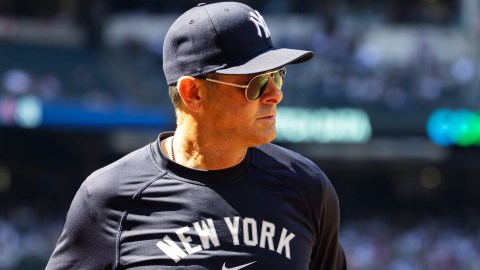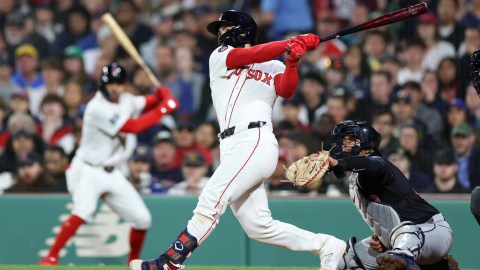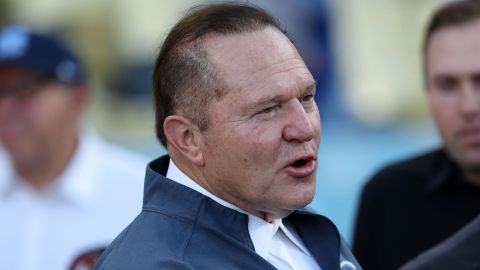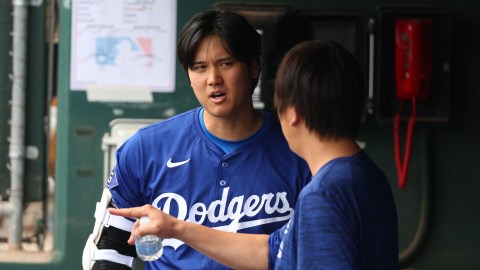When it comes to faith in sports, Tim Tebow is probably the first guy who comes to mind.
Tebow has most people thinking that being a Christian likely involves some form of constant prayer, shout-outs to Jesus and rules that get rid of a lot of fun.
But Tebow’s outspokenness isn’t the only way athletes sincerely approach faith. Bryce Harper, who ascribes to Mormonism, has become an example of another young, talented player who is bringing his beliefs into the public eye, albeit it in a much different way.
Both Tebow and Harper are showing the sports world that there are plenty of ways to talk about faith. And maybe, by doing that, they can help athletes and fans find a deeper understanding and growth when it comes to beliefs.
Harper is known mostly for his brash public persona, from his gamesmanship on the baseball diamond to his “clown question” cult hero status. He first broke into public consciousness when was labeled on a Sports Illustrated cover as the next great baseball player, a phenom who could hit bombs and had the tools for an incredible all-around game.
Harper’s ascent to the major leagues, where he now plays for the Washington Nationals, was full of awe, but it also had some hiccups. Harper has never been shy about showing his talent, and as he conquered each stage of the game, he started showing people up, too. He’s blown kisses at a pitcher, drawn lines in the dirt to show umpires where he thought strikes were balls and, overall, been pretty cocky.
That’s why a lot of people do a double-take when they find out Harper is Mormon — and not just check-a-box Mormon, but follow-the-book Mormon. Harper famously doesn’t drink (the source of “that’s a clown question, bro”), but he also doesn’t party or get into much mischief off the field.
It’s difficult to imagine the impetuous Harper as a devout anything, but by all reports, he’s serious about his faith. And as he becomes a larger figure in American consciousness, he hasn’t been shy about acknowledging what he believes and explaining how it fits in with his everyday life.
His approach is in great contrast to Tebow. Not only do the two athletes believe different things — please, understand that evangelical Christianity and Mormonism are extremely different, and very much needing the dividing lines that people draw — but they also live their beliefs in opposite ways.
Tebow leads with his faith, making it the forefront of everything he does. His eyeblack had Bible verses, and his virginity and other life choices are prime fodder in any interview. He even preaches at church services and prays publicly with people. Harper, on the other hand, has let his play and personality carry him so far, with his faith a comfortable but not controlling part of the conversation.
Both athletes are equally polarizing. While Tebow’s beliefs put most people off, Harper’s attitude is what riles people against him. If anything, Tebow is the perfect example of a person living out his faith no matter the costs, while Harper is the test case for whether people will accept players’ beliefs if the athletes put their game first and present their views as a secondary concern, in the realm of “I didn’t know that about him,” and “that’s interesting.”
So, which is better? Do you want someone who is upfront about his faith, who never shies away from the beliefs that have shaped his life, even to the point of being obnoxious? Or do you want a player who is in your face about how good he is but keeps his creed to himself?
Maybe the question here is not one of preference. Maybe the takeaway from seeing two guys who are so drastically different taking their faith into professional sports is that it matters less how someone presents his beliefs than that he is showing them in the first place. If faith is as important as those who follow it say it is — if it is truly life-changing and the rhythm by which people live — isn’t it great that these two athletes have found ways to carry it into a professional world full of ego, poor behavior, drug use or just flat-out immaturity?
Millions of Americans follow specific beliefs and creeds, but when it comes to public life, any matter of faith has been rolled into the “religion” category, where it’s become as dangerous as politics. It’s a touchy point, rarely discussed because of the disagreements it can cause. Seeing athletes show how their beliefs fit into everyday life, even at such a high level, should be an encouragement in a nation that struggles when discussing the topic. Faith shouldn’t be a dividing line — it should be a source of hope that brings people together. And seeing top-tier professional athletes who not only share their faith but also live it shows those watching that there’s more than dogma when it comes to centering one’s life around beliefs.
Whether people agree with Tebow or Harper or not, the beliefs by which they live are a major part of everyday people’s lives. Learning more about faith isn’t just a way to see how Tebow and Harper tick — it’s a way to strengthen communities and find the life-changing truth behind the smokescreen of religion.
Tebow and Harper aren’t fully representative of their respective faith communities. Mormons have to be a bit shy about some of Harper’s choices, especially concerning his attitude. Some of his actions don’t necessarily jive with Mormon teachings on good behavior. (Harper also breaks the mold on the clean-cut young Mormon missionary, although it should be noted that most religious sects aren’t so tight on their requirements for knee-length skirts and shirts and ties these days.)
Some evangelicals are just as unsure about jumping full-force behind Tebow. While he is open about his faith and lives according to his beliefs, he has also created a narrowness about what it means to be a Christian, especially among the younger generation.
But the bottom line is that both players are leaning on their faith to change their lives, and leaning on their place in the limelight to spread their faith further. Whether their eyeblack is covered in tidy Bible verses or streaming down their faces in brash confidence, they’ve brought the deeper life to the shine and charade of professional sports.
Critics may pick apart how Tebow chooses to live, and whether Harper’s moxie matches Mormon beliefs. But if they’re talking about that, they’re talking about faith. And that’s a boon to anyone who believes that that’s what really matters in all of this.



